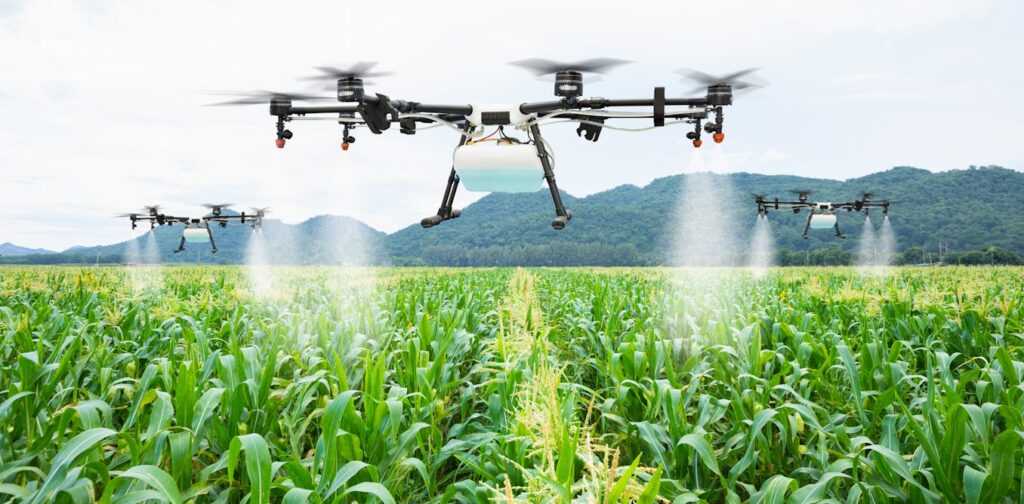cross Africa, a new phase of agriculture is taking shape, driven by the rapid emergence of Artificial Intelligence (AI) and digital solutions. With food security becoming an urgent issue amid a growing population, AI-powered farming is increasingly being seen as the future of agriculture. Smallholder farmers, who form the backbone of food production in Africa, are gradually embracing digital tools to boost productivity and efficiency.
However, a recent study has shown that despite the promise of digital farming, adoption rates among rural farmers remain relatively low. The research, conducted by agricultural expert Abdul-Rahim Abdulai and his team, examined how smallholder farmers in Africa interact with digital solutions and services. The findings paint a mixed picture of digital adoption in the agricultural sector.
Digitalization in farming is a broad concept, covering everything from the use of mobile phones and computers to advanced tools such as drones, satellite imagery, field sensors, and precision diagnostics systems. According to Abdulai, agricultural digitalization involves both simple and complex technologies. On one end, farmers may use mobile devices for accessing weather updates or market prices, while on the other, they may rely on AI-powered analytics for crop monitoring and disease detection.
The study categorized digital farming tools into different levels. Basic digital tools include phones, radios, and tablets, which provide access to farming information. More advanced digital systems include drones for aerial monitoring, satellite-based Geographic Information Systems (GIS), and field sensors that assess soil quality. The research also highlights the importance of blockchain platforms, which are increasingly being used for tracking supply chains and ensuring fair pricing in agricultural markets.
With the expansion of internet connectivity and mobile technology, more smallholder farmers have access to these tools. AI and machine learning, for instance, offer solutions for analyzing large amounts of farming data to improve decision-making. However, despite the potential, the actual usage of these technologies remains limited.
One of the key questions posed by the study was whether African smallholder farmers are actively adopting digital agricultural solutions. The findings reveal that while many farmers recognize the benefits of digitalization, the adoption rate is still disappointingly low.
The study explored the characteristics of farmers who use digital tools and the barriers preventing widespread adoption. It found that most smallholder farmers have little engagement with digital platforms. Instead, NGOs and development agencies play a more active role in introducing digital solutions rather than the farmers themselves driving the adoption process.
The research further highlights that while many farmers acknowledge the benefits of digital farming, they lack the necessary infrastructure, education, and financial resources to integrate these tools into their daily operations.
Despite the slow uptake of AI-powered farming, farmers generally hold a positive view of digitalization. The study found that 96.2% of smallholder farmers believe digital tools are beneficial for agriculture, while 81% see digital solutions as the future of farming. More importantly, 91.69% of farmers expressed a willingness to adopt digital solutions if the necessary conditions—such as affordability, training, and infrastructure—are put in place.
This shows that the challenge is not about convincing farmers of the benefits of digital agriculture but rather ensuring that they have the means to adopt these technologies.
Several factors contribute to the slow adoption of AI-powered farming solutions in Africa. One major challenge is the cost of advanced digital tools. Many smallholder farmers operate on limited budgets and cannot afford high-end technologies such as drones or AI-powered analytics. Additionally, unreliable internet connectivity in rural areas makes it difficult for farmers to access cloud-based digital services.
Another issue is the lack of technical knowledge. Many farmers are unfamiliar with how to use AI-driven farming solutions, making it necessary for training programs to be introduced. Without proper education on the benefits and application of digital farming tools, even the most advanced solutions will struggle to gain widespread adoption.
The research concludes that while digital farming holds great promise for Africa, its success depends on addressing the challenges facing smallholder farmers. To increase adoption, policymakers must focus on making digital tools affordable and accessible. Governments and private sector players should invest in rural internet infrastructure, while agricultural training programs must include digital literacy components.
The involvement of NGOs in promoting digitalization should be complemented by government-backed initiatives that ensure sustainability. Encouragingly, as internet access and mobile technologies continue to improve, the use of digital farming solutions is expected to grow. The key lies in making these tools relevant, affordable, and easy to use for smallholder farmers.
Ultimately, AI and digital farming technologies have the potential to revolutionize agriculture in Africa. But for this transformation to happen, farmers need the right support systems to help them transition into the digital age. The future of African farming is digital, but the journey towards full adoption is still a work in progress.
